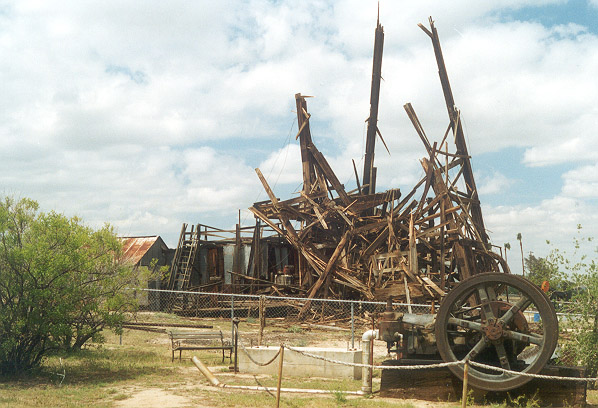Imprisoned

A hundred miles north of Los Angeles (but a two and a half hour drive), western Kern County looks like a more hilly Texas Panhandle, and it has a similar economic history. Take a look: this is Texas; this is west Kern. In the town of Taft, the Maids of Petroleum compete during Oildorado to see who will be chosen as Oildorado Queen, and the local museum is the Oil Museum.
Like most of the towns along Highway 33, Taft is transitioning. The thousands of oil derricks outside town have become hundreds of oil derricks, while a crisis over water allocation has devastated farms throughout the Central Valley. (The disputed politics of Central Valley water are worth a whole series of free-standing posts.) In Mendota, unemployment among the town's 10,000 residents has hovered around forty percent in recent years, and that's not a typo.
But the small towns along Highway 33 have found the answer to the question about their economic future. "In the last year alone," the mayor of Mendota has "worked tirelessly to secure $115 million in Federal funding for the completion of the Mendota Federal Correctional Institution." Residents can get information on prison careers from the city's website. Meanwhile, down the highway in Taft, the police department has a sideline: in addition to policing a city of 7,000 people, they also run a state prison camp under contract with the Department of Corrections. Next door to Taft's state prison: Taft's federal prison.
California's agricultural and industrial small towns are replacing production with incarceration. So, yes: state spending on prisons is destroying state funding for universities, and the prison guards' union and the war on drugs are substantially to blame.
But the prison business is also growing on the ruins of the withered productive economy that sustained small towns by the creation of value. California's remote small towns need the prison industry because it is, increasingly, all that they have left. The less we make, the more we lock people away. This is the perverse deal Californians have made for ourselves: when state universities compete for funding, we're competing against the survival of towns like Taft and Mendota, which relies on things like the incarceration of nonviolent drug offenders.
Our state universities are growing weaker and sicker because our productive economy is dying, and the replacements are vicious and inevitable.
ADDED LATER: See also this very recent story about the "bright future" for Taft's state prison, in spite of a new development.
